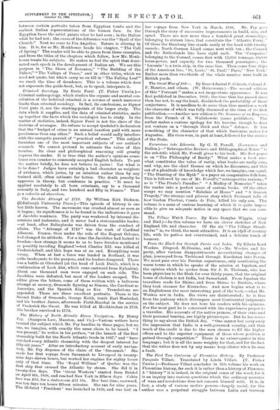The Jacobite Attempt of 1719. By William Kirk Dickson. (Edinburgh
University Press.)—This episode of history is one but little known. The movement was crushed almost as soon as it began ; its significance is to be found in the indications it gave of Jacobite weakness. The party was weakened by internal dis- sensions and jealousies, and it never had a statesmanlike leader. —at least, after Bolingbroke was driven from the conduct of affairs. The "Attempt of 1719" was the work of Cardinal Alberoni. France, then under the rule of the Regent Orleans, had changed its attitude. For a time the Jacobites had looked to Sweden—how strange it seems to us to have Sweden mentioned as possibly invading England !—but Charles XII. was killed at Frederickshall, and this hope was at an end. Everything went wrong. When at last a force was landed in Scotland, it was quite inadequate to the purpose, and its leaders disagreed. There was a battle at Glensheil (at the head of Loch Duich, which is a continuation of Loch Alst, which runs eastward from Kyleakin). About one thousand men were engaged on each side. The Jacobites were defeated, but most of the leaders escaped. The editor gives the letters, some of them written with a ludicrous attempt at secrecy, Ormonde figuring as Simons, the Cardinal as Amorslye, and the Spanish King as Ker. Translations are appended. There are three excellent portraits. There is the Second Duke of Ormonde, George Keith, tenth Earl Marischal, and his brother James, afterwards Field-Marshal in the service of Frederick the Great. He was killed at Hochkirchen in 1758. His brother survived to 1778.


















































 Previous page
Previous page